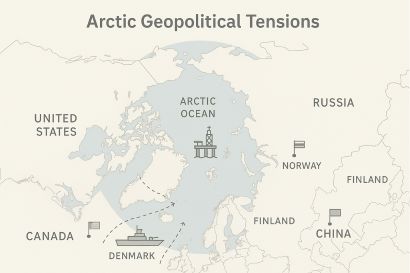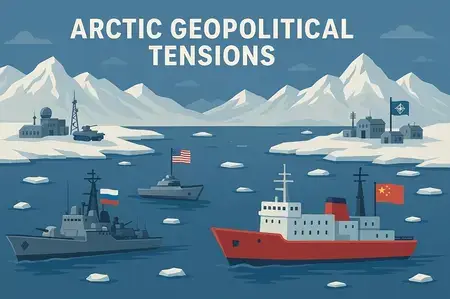Arctic Geopolitical Tensions- The Arctic, once a remote frozen frontier, is now a geopolitical flashpoint as climate change rapidly melts ice caps, unlocking untapped resources and strategic trade routes. Global powers like Russia, NATO, China, and the US are racing to control energy reserves (oil, gas, rare minerals) and dominate emerging shipping lanes like the Northern Sea Route. However, this scramble has sparked military tensions, sovereignty disputes, and ecological risks, while Indigenous communities fight to protect their livelihoods.
Why is the Arctic a Geopolitical Hotspot?
- Shift from Isolation to Strategic Zone: Previously inaccessible due to ice cover; now pivotal for trade, resources, and military influence.
- Climate Change as Catalyst: Rapid ice melt (Arctic warming 2–3 times faster than global average) opens new opportunities.
- Key Drivers:
- Resource Wealth: 30% of undiscovered natural gas, 13% of oil, rare minerals (e.g., cobalt, lithium).
- Trade Routes: Northern Sea Route (NSR) and Northwest Passage (NWP) reduce shipping time between Asia-Europe by 40% vs. Suez Canal.
- Military Significance: Proximity to the US (Alaska), Russia, and NATO countries.
Legal Framework for the Arctic Region
1. United Nations Convention on the Law of the Sea (UNCLOS)
- Primary legal instrument governing maritime boundaries, navigation, and resource rights.
- Key provisions:
- Territorial Waters (12 nautical miles): Coastal states have full sovereignty. Exclusive Economic Zone (EEZ – 200 nautical miles): Sovereign rights over resources (oil, fish).
- Extended Continental Shelf: States can claim beyond EEZ (up to 350 nm) if proven geologically contiguous (e.g., Russia’s 2001 claim over Lomonosov Ridge).
- Arctic-specific issues:
- Disputes over overlapping continental shelf claims (e.g., Russia, Canada, Denmark).
- Freedom of navigation in Arctic waters (e.g., U.S.-Canada disagreement over NWP).
2. Arctic Council
- Soft-law governance: Focuses on environmental protection and sustainable development (no binding laws).
- Members: 8 Arctic states (Canada, Denmark, Finland, Iceland, Norway, Russia, Sweden, U.S.).
- Observers: India, China, EU, and others (limited decision-making role).
- Key agreements under Arctic Council:
- 2011 Arctic Search and Rescue (SAR) Agreement: First legally binding treaty among Arctic states.
- 2013 Agreement on Marine Oil Pollution Preparedness and Response.
3. Key Challenges in Arctic Governance
- Non-binding nature of Arctic Council agreements.
- Overlap of EEZs and unresolved continental shelf claims.
- Militarization (e.g., Russia’s Northern Fleet) outside legal frameworks.
- Resource exploitation vs. environmental protection (e.g., oil drilling in Norway’s Barents Sea).
- Indigenous rights: Conflicts between industrial projects (mining, oil) and Inuit communities (UNDRIP principles).
Climate Change and Resource Competition in the Arctic Region
- Ice Melt: Arctic sea ice extent reduced by ~13% per decade since 1979 (NASA).
- Ecological Risks:
- Threat to biodiversity (polar bears, seals).
- Permafrost thaw releases methane, accelerating global warming.
- Risk of oil spills in fragile ecosystems (e.g., Russia’s Arctic oil projects).

Arctic Geopolitical Tensions: Stakeholders & Interests in Arctic Region
- Russia:
- Controls 53% of Arctic coastline; heavily invests in NSR, military bases (e.g., Northern Fleet), and LNG projects (Yamal Peninsula).
- Claims extended continental shelf under UNCLOS for resource extraction.
- China:
- “Near-Arctic State” self-declaration; Polar Silk Road under Belt and Road Initiative (BRI).
- Partnerships with Russia (e.g., LNG imports via NSR).
- USA:
- 2008 National Security Directive emphasized Arctic security; plans to deploy icebreakers.
- Alaska’s strategic importance for missile defense.
- Others:
- Nordic Nations (Norway, Denmark/Greenland): Balancing economic gains with sustainability.
- Non-Arctic States (India, Japan): Observer status in Arctic Council.
Important Agreements and Territorial Disputes in Arctic Region: –
Spitsbergen (Svalbard) Treaty (1920)
- Grants Norway sovereignty over Svalbard but allows all signatories equal rights to exploit resources.
- Controversies:
- Russia’s mining activities in Barentsburg.
- Disputes over fishing rights in Svalbard’s EEZ.
Ilulissat Declaration (2008)
- Signed by Arctic Five (Canada, Denmark, Norway, Russia, U.S.).
- Affirmed commitment to resolve disputes through UNCLOS and existing frameworks.
- Rejected calls for a new Arctic-specific treaty (like the Antarctic Treaty System).
Other International Agreements
- Paris Agreement (2015): Arctic states’ commitments to reduce emissions impacting the region.
- Central Arctic Ocean Fisheries Agreement (2018): Moratorium on commercial fishing in high seas of the Arctic.
- International Maritime Organization (IMO) Polar Code (2017): Regulates shipping safety and environmental standards in Arctic waters.
Territorial Claims & Disputes
- Lomonosov Ridge: Russia, Canada, and Denmark claim it as an extension of their continental shelves.
- Northwest Passage: Canada considers it internal waters; U.S. and EU call it an international strait.
- Northern Sea Route (NSR): Russia regulates it as internal waters under UNCLOS Article 234 (“ice-covered areas” exception).
Emerging Global Governance Gaps and Future Implications
- Territorial Disputes:
- Russia-Canada-US-Denmark rivalry over Lomonosov Ridge.
- Svalbard Treaty (1920) ambiguity: Norway vs. EU/Russia on fishing/mining rights.
- Militarization: Russia’s refurbished Soviet-era bases; NATO’s Arctic exercises (e.g., Cold Response).
- Economic Winners vs. Losers: Russia and China stand to gain from shorter routes, while traditional hubs like the Suez Canal and ASEAN’s Strait of Malacca face reduced relevance
- China’s Strategic Moves: Self-declared “near-Arctic state” investing in Arctic infrastructure (e.g., mining, research stations) under the Belt and Road Initiative
- Greenland’s Strategic Value: Trump’s repeated interest in acquiring Greenland (2025) sparked diplomatic friction with Denmark, while the US prioritizes its Thule Air Base for missile defens
- Environmental vs. Economic Goals:
- Tension between fossil fuel extraction (Russia’s Rosneft) and COP26 net-zero pledges.
- Indigenous rights (Inuit communities) vs. industrial projects.
Implications for India
- Strategic Interests:
- Energy security: Partnerships with Russia (e.g., Vostok Oil Project).
- SAGAR Policy: NSR could boost India-EU trade.
- Climate Impact on India: Melting Arctic ice influences monsoon patterns and coastal flooding in India.
- India’s Arctic Policy (2022): Focuses on climate research, sustainable development, and international cooperation.
- Scientific Engagement: Operates Himadri research station (Svalbard); studies climate feedback loops.
- Diplomatic Role: Advocate for “Common Heritage of Mankind” principle in Arctic governance
Way Forward–
- Avoiding Militarization: Ensuring the Arctic remains a zone of cooperation, not conflict.
- Balancing Economic Development with Conservation: Adopting sustainable resource management strategies.
- Strengthening Global Governance: Enhancing UNCLOS provisions and the role of the Arctic Council.
- Monitoring Climate Change Effects: Increased investment in scientific research and early warning systems.
UPSC Mains Question (GS II/III):
#GS-II and GS-III
Q. “The Arctic’s legal framework is a patchwork of soft laws and competing national interests.” Critically analyze.
(Focus on: UNCLOS limitations, Arctic Council’s role, territorial disputes)
Q. How does the absence of an Arctic-specific treaty impact global governance? Discuss with examples.
If you found this helpful, you might also like these articles:
📌 [ https://upscmatters.com/euclid-space-telescope-unveils-a-einstein-ring/]
📌 [https://upscmatters.com/nasa-parker-solar-probe-touching-the-sun/]
They cover key concepts that will boost your preparation! 🚀
📢 Stay Updated with the Best UPSC Resources!
Join our Telegram Channel for:
✅ Daily Current Affairs
✅ Important Notes & PDFs
✅ Answer Writing Tips
✅ Strategy & Motivation
📲 Click the link to join now: [https://t.me/upscmatters] or [https://t.me/ramsirnotes]
Don’t miss out on valuable updates! 🚀

